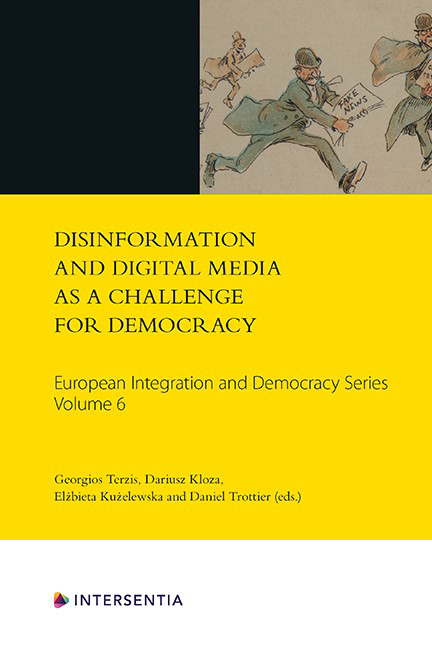Book contents
- Frontmatter
- Foreword: Fooling All of the People All of the Time: Democracy in the Age of Fake News
- Introduction: ‘They All Hear “Ping” at the Same Time’
- Contents
- List of Abbreviations
- List of Contributors
- PART I THEORETICAL APPROACHES TO AND THE CONCEPTUALISATION OF DISINFORMATION
- PART II EXPERIENCE OF DEALING WITH DISINFORMATION
- PART III SOLUTIONS TO DEAL WITH DISINFORMATION AND THEIR CRITIQUE
5 - Democracy and the Pre-Conditions of Communication
Published online by Cambridge University Press: 26 May 2021
- Frontmatter
- Foreword: Fooling All of the People All of the Time: Democracy in the Age of Fake News
- Introduction: ‘They All Hear “Ping” at the Same Time’
- Contents
- List of Abbreviations
- List of Contributors
- PART I THEORETICAL APPROACHES TO AND THE CONCEPTUALISATION OF DISINFORMATION
- PART II EXPERIENCE OF DEALING WITH DISINFORMATION
- PART III SOLUTIONS TO DEAL WITH DISINFORMATION AND THEIR CRITIQUE
Summary
INTRODUCTION
The growing concern over fake news or disinformation incites the European political community. For example, the EU has established an expert group to study this issue. A recently adopted German media law called NetzDG is another response to this phenomenon. Many fear that disinformation and even the digital media as such could pose a challenge for democracy, the rule of law and even fundamental rights. In an attempt to delve into this growing fear, this chapter analyses the various aspects of fake news on the basis of the following theme:
The influence of social media and the digital revolution on the political foundations of society.
The underlying idea is that the core values on which representative democracy leans – as they were understood after the emergence of liberal democracy in 1848 (taking the Netherlands as a point of departure, because of the comparatively early liberal-democratic Constitution) – originate from a time when communication between politicians, compared to the present time, was a slow process. The classic liberal example of a good politician was that of an ‘enlightened statesman’ – someone with the ability to distance him-or herself from the voter and the delusions of the day, in order to make space for a more thoughtful reflection. Nevertheless, is that idealistic image still viable in this (post)modern era? Nowadays, politicians have different means to express their reflections and respond directly to their voters, colleagues and fellow citizens through social media platforms. Experts have referred to this situation as the ‘digital economy’ and, as such, we will have to shed light on the shifting economic reality of news production.
THE DIGITAL EVOLUTION IN REPRESENTATIVE DEMOCRACY
In this chapter, I argue that a system of representative democracy as a type of regime is upheld by presuppositions on communicative proceedings and that a ‘fatigue’ or ‘discomfort’ about representative democracy stems from changes in these core suppositions. Therefore, here I will answer the question what the digital revolution means for both practical political expertise and the ideological foundations on which political decisions are made, as well as what kind of arguments are put forward in debates.
- Type
- Chapter
- Information
- Publisher: IntersentiaPrint publication year: 2020

